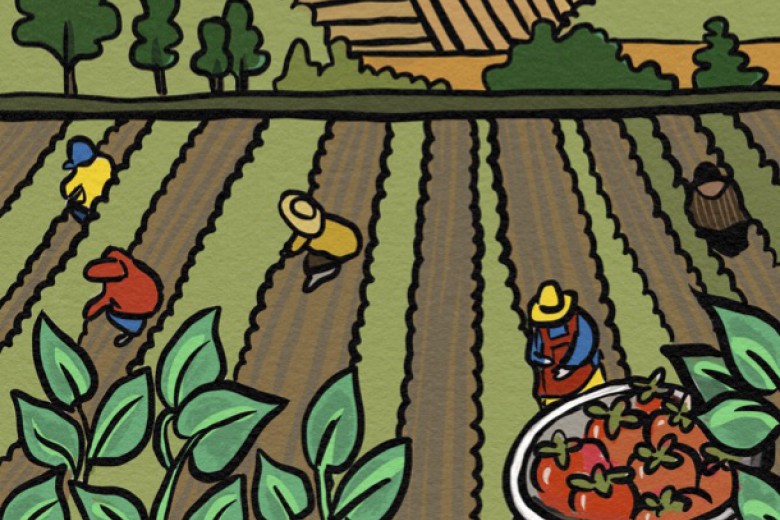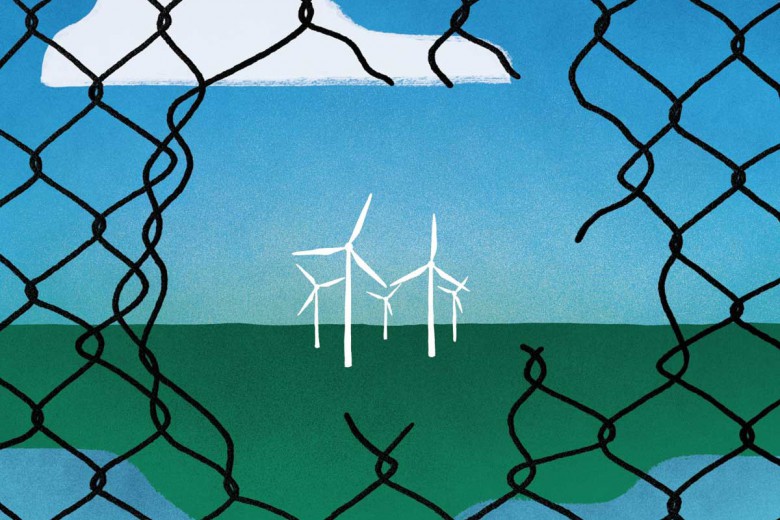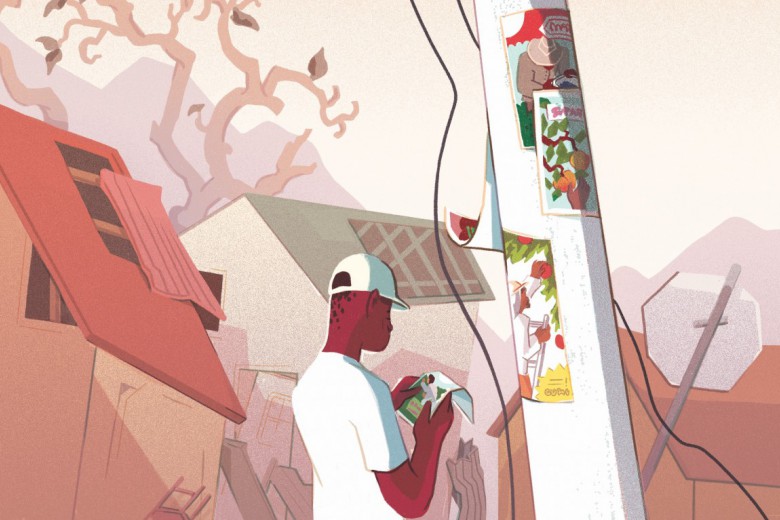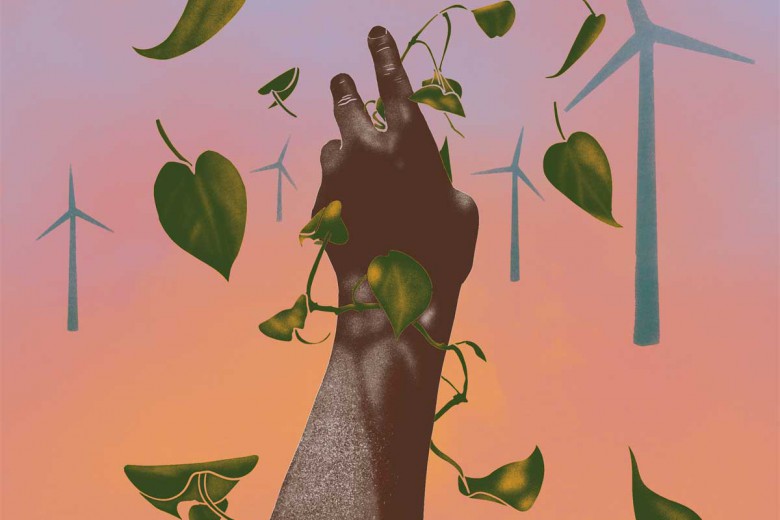Mostafa Henaway is a longtime community organizer at the Immigrant Workers Centre in Montreal, and is also a member of the Ontario Coalition Against Poverty in Toronto. Mostafa is active in struggles in solidarity with Palestine and Indigenous rights here on Turtle Island.
Hayley Zacks is a young Ashkenazi Jewish queer femme living as an uninvited guest on unceded and unsurrendered Mi’kmaq territory of K’jipuktuk. They have been organizing on issues of climate justice since they were 18, and focus primarily on supporting Indigenous front-line resistance to fossil fuel projects.
Jamie Kirkpatrick has been an environmental activist for more than 25 years. He is the program manager for Blue Green Canada, an organization made up of labour unions and environmental and civil society organizations advocating for working people and the environment by promoting solutions to environmental issues that have positive employment and economic impacts.
Kali Akuno is the co-founder and director of Cooperation Jackson, based in Jackson, Mississippi. Kali is an organizer for Black liberation and a human rights and environmental justice advocate and educator.
Heather Milton-Lightening is a Treaty 4 rights and title holder registered at Pasqua First Nation. She brings 20 years of organizing experience in Indigenous rights, environmental justice, and development. Heather is Anishinaabe, nêhiyaw, Blackfoot, Dakota, and Welsh.
How do you define or talk about just transition in your work, organizing, or sector?
MH: As a migrant justice organizer active in trying to stop deportations and in campaigning for better conditions for migrant workers, I speak about the idea of a just transition in a global context. I think it is important for a wider audience to understand how extractivism and mining industries are linked to displacement and migration. I think about a just transition in a more global context – about how such industries which are rooted in the Global North are impacting the vast majority of people in the Global South. By accelerating climate change, they’re causing displacement and creating poverty in the Global South, driving people to migrate to places such as Canada. So for me the ideas of a just transition and migration are fundamentally linked. A just transition is about larger structures of colonialism, capitalism, and imperialism that drive profit before the needs of the planet and people.
HZ: Just transition for me means that we prioritize justice for those who have faced harm because of fossil fuel extraction. I look at a just transition and consider how Indigenous communities and communities of colour will be impacted by a shift to renewable energy. Will it just be another form of capitalist domination by a different name, or can we radically change the way economies function and what ownership looks like?
JK: Just transition has an expanding definition in my sectors. The overall aim is ensuring no one is left out or left behind as we make economic and societal changes, for our health and the environment, that impact carbon-intensive industries. We now make sure to include all equity-seeking groups, and highlight the importance of decent work for all.
KA: When we talk about just transition we are explicitly talking about a transition away from the capitalist system and toward the bottom-up construction of a regenerative system based in eco-socialist practices. We are very explicit that the present system not only is not working for the vast majority of the people in Mississippi, but it is in fact eviscerating complex life on Earth. In our context we focus on the history of chattel slavery as an extractive and super-exploitative system, and note how this system continued under sharecropping and continues today through mass incarceration. In observing these basic contextual factors, we note that, given the self-destructive tendencies of the capitalist system, there will inevitably be a “transition” – but whether it is “just” or not is up to us.
HML: As Indigenous Peoples, our responsibility is to the next seven generations ahead of us. Just transition creates a space for endless possibility in visioning the future we want to see. Could we create a world where traditional work – a.k.a. “live to work and work to live” – isn’t needed? Could we foresee and plan for a world in which racism, in all of its forms, is non-existent? Could we create real sharing economies? As Louis Riel said, “My people will sleep for one hundred years, but when they awake, it will be the artists who give them their spirit back,” and I believe that art, creativity, and thinking outside the “traditional” organizing box is what makes just transition so beautiful.
Do you see a difference between your understanding of just transition and the mainstream understanding? If so, in what ways? Are there critical gaps?
MH: There’s the idea that green capitalism can exist, with enough public support and subsidies toward green energies and industries. Also there is the idea of “a million green jobs.” While green capitalism can exist in terms of renewable energies and sustainable or green cities, it does not address the fact that those benefits will not be distributed equally.
It begs the question: how will corporations export dirtier industries to the Global South? If you look at the largest corporations globally they are either within the auto sector, or they are oil companies. The power they wield will not simply diminish by the existence of some market-based alternatives. Just transition asks us, how do we reimagine our priorities? Thus a just transition is about a radical democracy and a new type of society that cannot exist under capitalism.
HZ: I worry about the way that corporations such as Shell and Syncrude have adopted the language of transition, as well as the federal government discussing a renewable future. To me, there is nothing “just” about having the same oppressive powers (federal government and corporations) control the energy sector, just with a different source of energy. To achieve a true just transition we must prioritize the wants and needs of the communities most impacted by the fossil fuel industry, and find a way to shift away from economies of oppression and destruction, to economies controlled by communities.
KA: Yes, absolutely. In our view, most of the mainstream understandings and definitions regarding a “just transition” centre on reforming the capitalist system, not transforming or ending it. This is even true for most of our allies in the struggle for a “just transition.” These reforms centre around transitioning workers to clean industries from dirty industries, or transitioning communities from dirty energy production – i.e. coal, gas, or hydroelectric – toward more sustainable forms of energy, like solar and wind. While both of these are necessary components of the transition we are aiming for, neither of these in and of themselves transition the system from various forms of extraction, or the logics of accumulation and private appropriation of wealth. It is these latter systems that have to change if we are going to end the utterly insane logic that says that we can and must have infinite growth on a planet with limited resources. So, our notion of just transition is centred on systems change, not just industry and employment transitions.
JK: I think we risk making a major mistake if we think there is a “mainstream” understanding of just transition among the largest of our audiences: the general public. I think that the average person has no idea of what a just transition is and even those more “informed” would likely describe transitions quite differently. There can be no one-size-fits-all definition of a just transition. I feel that we should focus our energies on identifying ways to work collectively toward shared goals of fairness, local control in decision-making, protecting the environment, and protecting a future for our families and generations to come.
What does the “just” component of a just transition look like for your community, organization, or sector? What are the main concerns in pursuing a just transition in your work?
HZ: I worry that within environmental organizing we are so focused on the transition to renewables that we lost sight of the need for real and meaningful justice to inform this transition. There can be no justice if renewable energy continues to perpetuate the stealing of Indigenous lands and the exploitation of communities of colour. My main concern is ensuring that the transition is led by Indigenous nations whose land the transition takes place on, and that central to this transition is recognizing the sovereignty of Indigenous communities. Most especially, there needs to be the free, prior, and informed consent of Indigenous communities.
MH: The “just” part for migrant justice is about trying to tackle the structural issues of displacement – whether it’s from the Global South or continued colonization of Indigenous land and resources. Thus it’s the land that becomes a central component to the “just” part of a transition. Communities and people must have true control over their lands, and the ability to continue to live on their lands and continue their livelihoods. The same corporations like Rio Tinto, which displace communities in Guinea for bauxite mining, are also displacing Indigenous nations here on Turtle Island. We have to begin to tackle questions of status for all, questions of how working-class communities which are being pushed out into the suburbs can access public transportation, how we define decent work, and how corporations which drive down wages and majorly contribute to the climate crisis can be stopped.
KA: The “just” component to us entails ending the logic and practices of colonization, extraction, exploitation, and hierarchy that underscore the capitalist-imperialist system that we are subject to. This entails upending the balance of power by decolonizing and decommodifying the land in our communities, re-establishing and expanding the commons, creating worker-owned and -controlled productive enterprises, creating comprehensive systems of social solidarity and community caring. To us, we have to change how and why we use fossil fuels, which entails first and foremost changing our relationship with each other and with the Earth.
JK: Transitions will happen, but justice must be demanded and fought for. I support all of the comments of my fellow correspondents. For me, it’s vital to centre this movement in people and not broad policy declarations.
HML: The transformation of justice is really key. How do we ensure that Black lives matter while respecting Indigenous rights that elevate LGBTQ people and women so that no one is left out? How do we plan to heal from neo-colonialism and capitalism while creating the world we want to see? Do prisons exist in the future we want to see? Or the military and police state? How do we re-align ourselves to have a respectful and just relationship with life itself?
Is just transition work transformational, and/or visionary? What is your perspective on the long-term strategic impact or potential of a just transition?
HZ: I think that just transition work can be transformational if we really take the call to justice seriously. Engaging in the shift away from the fossil fuel industry provides an opportunity to reimagine the way we think about energy and the economy, and truly transition away from the systems of oppression that the fossil fuel industry has been built on.
MH: I think so, if we consider the deep interconnectedness of oil to the development of industrial capitalism and the economic system which has created immense inequality, war, imperialism, and displacement in the name of profit. Thus a just transition can be a strategic approach to a more transformative project if we build a broad movement with leadership of Indigenous communities, migrants, unions, and racialized communities to push for that transformative project. The undesirable scenario – not in the near future but in the very long run – is a just transition for a few and climate degradation and its consequences for the rest. I think we see this happening already on a micro scale – we see green communities, green condos, and access to fresh food only for the wealthy.
KA: Yes, in our view just transition work is and must be transformational. If it is not, it will only compound the problems that we have by simply rearranging what exists and making an utterly destructive system “clean.” Changing how we relate to each other, how we value each other, how we relate to the Earth, and how we value all of the life on Earth are the most transformative things we can do. The system that we have and the values that it engenders are antithetical to life – as we are witnessing before our very eyes, with the collapse of our ecosystems and the acceleration of the sixth extinction event. We are now at the stage where we have to be visionary and prefigurative in our planning and action at the same time, otherwise we are helping to ensure the extinction of our species.
JK: By necessity just transition work is transformational – whether it’s reactive work to help vulnerable communities through disruptive economic changes or proactive planning to address challenges before they become full crises. The long view of a just transition is a completely reoriented society where people’s well-being would be at the centre instead of the accumulation of wealth by the few.
HML: Yes, the long-term impact will be the seventh generation. We will have left a legacy of deeply rooted change that ensures their existence and hopefully a new world-view or paradigm shift. For many Indigenous Peoples this work is what we call decolonization or reconcillation; healing the past, in the present, for the future.
What are projects, campaigns and strategies that are doing just transition work now? Do you think the approaches and strategies are effective?
HZ: The work of Lubicon Solar is an incredible demonstration of just transition work. This is an Indigenous solar project in the heart of the tarsands that demonstrates a rethinking of energy as community-owned and Indigenous-controlled. Indigenous Climate Action (ICA) is an amazing organization that is doing the work of imagining a fossil fuel-free future grounded in Indigenous rights and the free, prior and informed consent of Indigenous communities.
KA: In our view, there are a number of critical just transition projects that we think are pointing the way to a new future, including the work of the Black Mesa Water Coalition, Soulardarity, and Co-op Power, to name a few. However, despite the critical and inspiring work these organizations and many others are doing, we have to be honest and note that as of yet none of our strategies and approaches are reaching the scale that we need them to. We have some more movement-building and consciousness-raising to do on a mass level before our strategies can begin to have a transformative impact. So, we have a long, long way to go in a very short period of time.
JK: The federal Task Force on Just Transition for Canadian Coal Power Workers and Communities released two important reports with their submission of recommendations to Minister of Environment and Climate Change Catherine McKenna. These reports directly relay the concerns of people who live and work in Canada’s coal communities. Their voices and concerns are worth listening to. The task force’s main report includes detailed policy recommendations and asks for new funding to tackle the issues of just transitions beyond Canada’s coal communities. Their report on what they heard is definitely worth a read to get a snapshot of the diversity of challenges, opportunities, questions, and concerns that those directly impacted by this transition away from coal have to share.
HML: There are so many projects, programs, and organizations doing transformational work. From Indigenous language revitalization to midwifery, from reclaiming lands to building gardens, from stopping industrial development projects to the resurgence of ceremonies. The range of activity is so great. However, the challenge is massive change – as Kali mentioned – and at a much faster pace. A cookie-cutter approach doesn’t work for every community, nation, or even every family. Strategies that work in the Pacific Islands are not going to work in Treaty 4 territory or for the Black Creek community in Toronto. That can be really challenging or really beautiful depending on your perspective. Co-operatives might not work on reserves but might be a good strategies in urban areas as they shift away from a capitalist economy. Lastly, there is no road map of how to decolonize, or how to create a world without capitalism; just transition, in many cases, is trial and error. Some strategies will work and others will fail.







